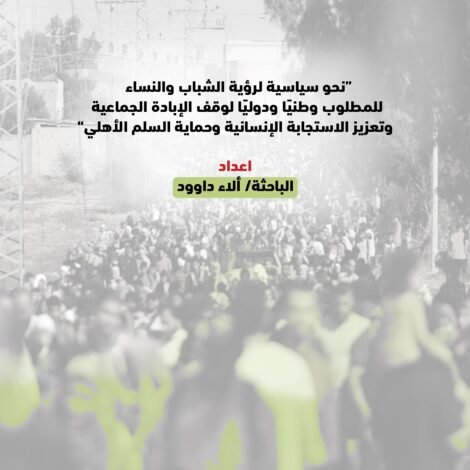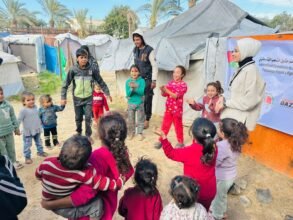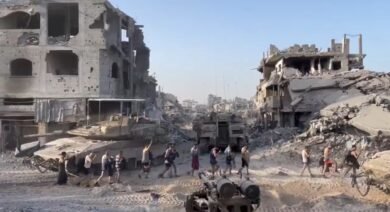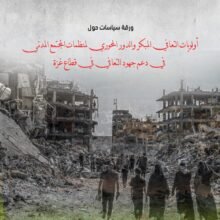
ICSPR Issues Policy Paper Entitled: “Towards a Policy Reflecting the Vision of Youth and Women on What Is Nationally and Internationally Required to End Genocide, Enhance Humanitarian Response, and Safeguard Civil Peace
1 September 2025
Press Release
ICSPR Issues Policy Paper Entitled:
“Towards a Policy Reflecting the Vision of Youth and Women on What Is Nationally and Internationally Required to End Genocide, Enhance Humanitarian Response, and Safeguard Civil Peace”
The International Commission to Support Palestinian Rights (ICSPR) has issued a policy paper prepared by researcher Alaa Dawood, addressing the reality of Palestinian women and youth under the ongoing genocide in the Gaza Strip since 7 October 2023. The paper highlights the grave humanitarian and national challenges they face, while presenting a comprehensive vision of what is required both locally and internationally to end the aggression and promote civil peace.
The paper underscores the unprecedented humanitarian catastrophe endured by Palestinians in the Gaza Strip since October 7, 2023. By August 2025, the ongoing aggression had claimed the lives of more than 62,622 Palestinians, including 12,400 women, and left around 157,673 wounded, with women constituting 70% of the injured. Official statistics further indicate that youth, who represent about 21% of the total population (approximately 1.2 million young men and women), have suffered immensely, with 24% of the total martyrs coming from this age group—both males and females alike.
The paper explains that women are bearing additional and severe burdens, including the loss of breadwinners, collapse of basic health services—especially in reproductive health—and an alarming rise in gender-based violence. Meanwhile, youth are deprived of access to education, face the loss of work opportunities, and are constantly exposed to risks of arrest, injury, or disability, placing their future in jeopardy.
The paper further warns that policies of blockade, deliberate destruction of infrastructure, and restrictions on humanitarian aid entry have exacerbated hunger and famine levels, collapsed the health system, and deteriorated the humanitarian situation to catastrophic levels. This, in turn, has directly impacted Palestinian civil peace, fueling rising indicators of insecurity, social tensions linked to aid distribution and scarce resources, all amid the absence of a unifying national framework capable of shielding society from chaos or internal conflict.
Despite clear orders issued by the International Court of Justice to adopt urgent measures to prevent further deterioration, alongside binding Security Council resolutions such as Resolution 2720 (December 2023) on humanitarian aid, and Resolution 2728 (March 2024) calling for an immediate ceasefire, the paper affirms that implementation on the ground has remained limited and fragmented. This has allowed grave violations to persist, humanitarian workers to be targeted, and aid delivery to civilians to be systematically obstructed.
In light of this reality, the paper presents a comprehensive vision stressing the necessity of engaging women and youth not only as victims, but as active agents of change. Their meaningful inclusion in decision-making and humanitarian response management would help reduce social tensions, safeguard civil peace, and ensure more inclusive and just national responses.
Through the policy paper, ICSPR proposed three interrelated pathways reflecting the core of the youth and women’s vision:
1. Binding and Swift International Action: including an immediate halt to military operations, enforcement of ICJ orders and UNSC resolutions, protection of civilians and humanitarian workers, and the unconditional entry of humanitarian assistance.
2. Gender-Sensitive Humanitarian Response: through sustained funding for reproductive health services, creation of safe spaces for women and girls, prevention programs against gender-based violence, and prioritization of women- and youth-led organizations in implementation and accountability.
3. Safeguarding Civil Peace Nationally: by fostering community partnerships led by youth and women, regulating unlicensed weapons, monitoring hate speech, applying restorative justice solutions, and revitalizing the Women, Peace and Security (UNSCR 1325) and Youth, Peace and Security (UNSCR 2250) agendas.
The paper stressed that empowering women and youth is neither a luxury nor a secondary demand, but a strategic necessity to protect society from fragmentation and to build an alternative path that restores trust and lays the foundations for a just and comprehensive peace.
ICSPR concluded by emphasizing that what is required nationally and internationally goes far beyond the management of a temporary humanitarian crisis. Rather, it is a political and moral imperative that demands the international community to rigorously uphold international law, while obligating local actors to reinforce unity and civil cohesion in the face of looming dangers.





